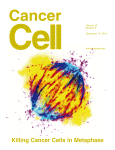 | |
| Discipline | Oncology |
|---|---|
| Language | English |
| Edited by | Steve Mao |
| Publication details | |
| History | 2002–present |
| Publisher | |
| Frequency | Monthly |
| Delayed, after 12 months | |
| 50.3 (2022) | |
| Standard abbreviations | |
| ISO 4 | Cancer Cell |
| Indexing | |
| ISSN | 1878-3686 |
| Links | |
Cancer Cell is a peer-reviewed scientific journal scientific journal that publishes articles that provide major advances in cancer research and oncology. The journal considers manuscripts that answer important questions relevant to naturally occurring cancers. Areas covered include basic cancer biology, therapeutic development, translational research, cancer model development, multi-omics and computational biology. Cancer Cell is also interested in publishing clinical investigations, in particular those that lead to establishing new paradigms in the treatment, diagnosis, or prevention of cancers; those that provide important insights into cancer biology beyond what has been revealed by preclinical studies; and those that are mechanism-based proof-of-principle clinical studies.
Contents
- History
- Changing for a better future editorial
- Diversity and inclusion efforts
- References
- External links
Cancer Cell is internationally regarded as one of the top cancer research and oncology journals. According to the Journal Citation Reports, the 2022 impact factor of the journal is 50.3. It is part of the Cell Press portfolio, which is owned by Elsevier. Issues are published monthly in print and online versions. All content becomes available for free one year after publication. In January 2021, Cancer Cell became a Transformative Journal as part of Elsevier's efforts to increase Open Access content. [1] [2]
Cancer Cell publishes Research, Review, and Perspective articles, in addition to opinion pieces such as Letters, Commentaries, Previews, Spotlight, and Voices. The journal often publishes a yearly special issue with a compilation of review articles around a common topic. In the Cancer Cell website, articles can be browsed by Issue, Collection, early online access ("Online Now"), or annual "Best of Cancer Cell".